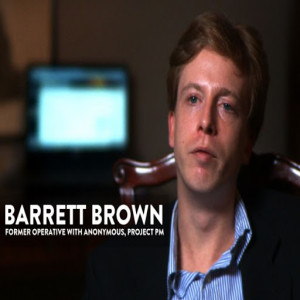
Parallax Views w/ J.G. Michael
Society & Culture

In light of a recent piece by Der Spiegel, one of the largest news magazine publications, on the legacy of controversial Barrett Brown and the early 21st century "hacktivism" of Anonymous, Barrett Brown returns to Parallax Views for a jam-packed two-hour conversation addressing Barrett's criticisms of the article.
Specifically, Barrett takes issue with Alexandra Rojkov, the author behind the piece, using a tweet by Claire Lehmann, founder of the equally controversial Quillette magazine (which has promoted writings related to "race realism" as well as, at one time, the work of Andy Ngo), accusing Brown of "harassing women in tech". Within said tweet Lehmann offered, as evidence, a retweet ofBrown asking for "anyone with information about [Peter] Thiel associate Riva-Melissa Tez" to "please email me". In this conversation, argues that a call to potential sources interested in offering him information on Riva-Melissa Tez stretches the credulity of the term harassment and would require a concrete definition of harassment to be laid out. Additionally, he says, Lehmann's tweet inadvertently gave Brown the information he sought from sources who saw it.
From there we begin to delve into the larger failures of the press through a multitude of examples, from the Dallas press's employing a white supremacist radio host who went by the psuedonym Spectre to the recent report by Jared Holt, Angry White Men, Right Wing Watch on Michael J. Thompson, a figure within the conservative movement who moonlighted as the alt right personality "Paul Kersey". Why are these figures allowed to exist within the institutions for so long while Barrett Brown and a whistleblower like Val Broeksmit are smeared for pasts involving drug use?
This leads us into a discussion Peter Thiel and his software company Palantir. Brown explains what he sees as the relationship between Thiel and the press. In addition, he argues that there are connections between Thiel and magazines like Quillette as well the infamous hacker Andrew Aurnheimer aka "weev". Moreover, Brown says the the story of Thiel's rise, the advent of the alt right, surveillance, and other issues are interrelated and not yet fully known to the public.
In addition, Brown discusses the nature of Thiel's agenda and whether it is, as the mainstream media presents it, libertarian in its nature or rather, as investigative journalists like Corey Pein have alluded to, is connected to "The Dark Enlightenment" of neoreactionary philosopher Nick Land. Moreover, Brown says that Palantir is at the center of much more than normally recognized and that Thiel and his agenda is the most dangerous in the world. At this point Brown delves more deeply into the ideology of this "Dark Enlightenment", the premises it is based on, why it is capable of making an argument in a persuasive fashion, and why it must be opposed. Particularly, he notes that "The Dark Enlightenment" persuades by pointing out, often correctly, the failures of institutions within Democracy currently. Brown, however, says that we must find an alternative to counteract this ideology, which he says will manage to become a strong attractor for those with inherited wealth and spreading out from that point.
We wrap up the show with Brown announcing the hiatus of the Pursuance Project and a possible Hollywood collaboration with Alex Winter in the future.
Then, for what may be the first time, the life, legacy, and mysterious death of journalist Michael Hastings as well as his relationship to Hastings. Hastings was a journalist who gained much recognition for his work on the Iraq war. After the death of his fiancée, Andrea Pahramovich he wrote a book about her passing and his relationship with her in I Lost My Love in Baghdad: A Modern Love Story. Hastings wrote for both the Rolling Stone and Buzzfeed. During the Obama years Hasting becase very critical of what he saw as a state-sponsored war on journalists. He won the George Polk award for his Rolling Stone profile of Gen. Stanley McChrystal entitled "The Runaway General"
Unfortunately, Hastings passed away under controversial circumstances (many alleged conspiracy/foul play) on June 18, 2013. In this portion of the conversation Brown outlines his relationship with the late journalist, their shared concerns, and Hastings' treatment by the media.
All that and more on this edition of Parallax Views.
SUPPORT PARALLAX VIEWS
ON PATREON!
FOR
BONUS CONTENT
AND
ARCHIVED EPISODES!
More Episodes
Create your
podcast in
minutes
- Full-featured podcast site
- Unlimited storage and bandwidth
- Comprehensive podcast stats
- Distribute to Apple Podcasts, Spotify, and more
- Make money with your podcast
It is Free
- Privacy Policy
- Cookie Policy
- Terms of Use
- Consent Preferences
- Copyright © 2015-2024 Podbean.com






